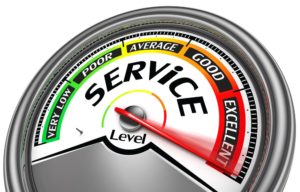
A lot of people have fancy things to say about customer service, but it’s just a day-in, day-out, ongoing, never-ending, persevering, compassionate kind of activity. —Leon Gorman, former chairman of L.L. Bean
“Due to COVID-19 . . .” That sentence has been finished a bazillion times and most often details a new or continuing issue that impacts customer service. Long wait times for replacement parts and service calls or a thousand other items. Restaurants and retail establishments closed during what used to be regular business hours—medical appointments and procedures scheduled unbelievably far out. Standard operating procedures have become a plastering of short-staffed, hours-adjusted, sorry-about-this-or-that signage affixed to business doors. Even email signatures now include a pandemic excuse, I mean, disclosure.
There’s no denying it’s been a rough two years for businesses across the board. Many companies were forced to close or radically adjust the how of doing business, followed by massive and ongoing supply chain issues and an unprecedented shortage of employees. Like we said, challenging times. But at least there’s someone, er, something to blame –it’s the pandemic’s fault, right?
The truth is that folks are weary to the bone with all things pandemic-related. Both sides of the table, the business world and the consumer, have had it up to here. While some businesses have rallied their troops to be the best they can be despite very challenging times, the sad truth is that others have not. In all honesty, some businesses have adopted an attitude that practically yells, “There’s nothing we can do. So, stop whining about our poor customer service, would ya?”
They’ve attached a COVID excuse to nearly every concern presented by their customers –blaming everything that could go wrong on the pandemic.
Ouch.
Well, sometimes the truth hurts.
The “we’re all in this together” rallying cry that fueled a spirit of teamwork in those early days has grown faint. It’s one thing to understand that business as usual may never return to the extent we’d like. It’s a different world now. But it’s an entirely different issue to blindly accept that customer service has become an inevitable casualty of the pandemic.
Customers have had enough. They’ve reached the point of taking names and taking action. Now, let’s be clear. This action should never result in verbal or physical abuse. Screaming at the cashier or throwing punches at anyone is never appropriate. But choosing to take one’s business elsewhere? That is proper, fitting, correct—all of the above.
Excuses vs. Explanations
Unending COVID excuses send a loud and clear message, combining variations of “it’s not our fault/we’ve stopped trying/there’s nothing we can do to help you, so not our fault.” The message will grow old in short order, and people will move on.
Excuses create a roadblock, whereas explanations encourage forward motion. While the terms are often used interchangeably, life coach Sara Rosseel reminds us there is a difference between an excuse and an explanation.
“An excuse says to others you believe you should be excused, that it’s not your fault, and that you deserved to be released from blame, responsibility, or the need to apologize. On the other hand, an explanation seeks to clarify or explain why something happened the way it did or why it is the way it is. When someone explains, they also make a statement of accountability.”
If you think back to pre-March 2020—it’s a stretch, we know—you’ll remember that life wasn’t perfect. Things got delayed, fouled up, were inconvenient, whatever. But we dealt with it, made adjustments, and pushed onward. We didn’t have the pandemic to blame then. Did folks still make excuses? Of course, they did! It’s the easy route, always has been. It’s also an incredibly addictive, nasty habit with ample fuel during these challenging times.
The Moment of Truth
Who cares enough about the company’s future to ask the hard questions? Questions like—
- Are we satisfied with the level of customer service we’re offering?
- Has it become the ‘norm’ to give less than our best to our customers?
- Have we let the pandemic become our go-to excuse?
If you uncover more excuses than explanations, take a deep breath and vow to chart a better course. But, of course, as you strive to move beyond excuses, there will be more hard questions to answer. For example, how many of your current employees were with you pre-pandemic?
- How many of your “newbies” know what constitutes excellent customer service?
- Has frequent turnover and staffing shortages shot holes in the training program/process that once emphasized customer service as the staple it should be?
- Who, if anyone, is accessing customer service? Is anyone tuned in enough to know what is or is not happening?
- Who, if anyone, is actively promoting customer service on a day-in, day-out basis?
“But you don’t understand. We’re only holding on by a thread.”
For many businesses, the above statement is the hard truth. It has indeed been a long, difficult two years. But if you’ve not thrown in the towel and don’t plan to, then moving beyond the “pandemic excuse” is your only hope for survival.
We are all still in this together—this settling into a post-pandemic world. But the initial tolerance and understanding that coursed through the consumer have waned. The “because of COVID” excuses have got to go. Customer service must rise to the level of importance it once held—no more excuses.
The ASJ Partners team has stood faithfully with the recruiting and staffing industry, working side by side to weather the storm that threatened to wreck the industry. Our commitment to the firms that partner with us has never been stronger. Get in touch with us to see what our experience and dedication can do for your staffing firm.




